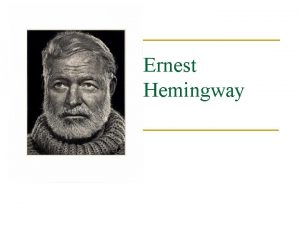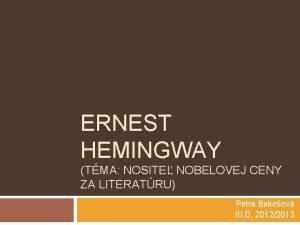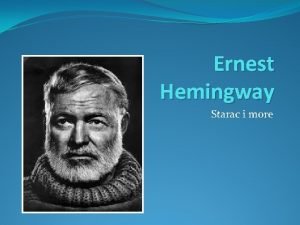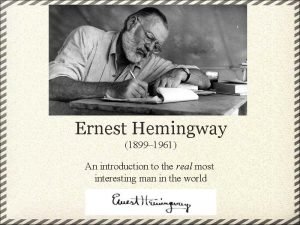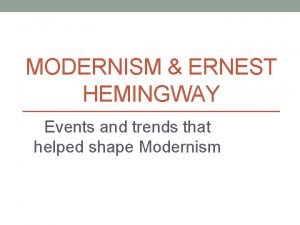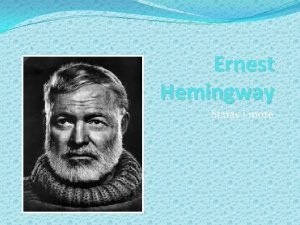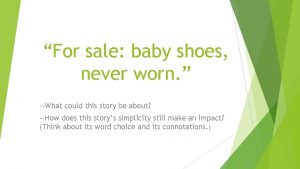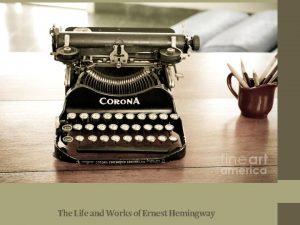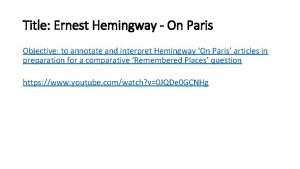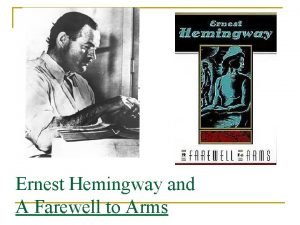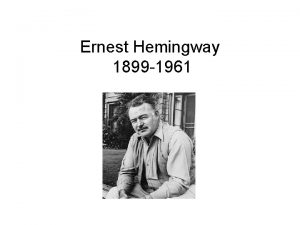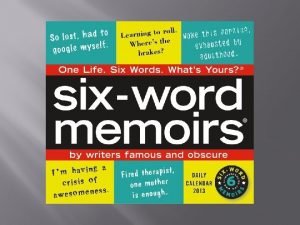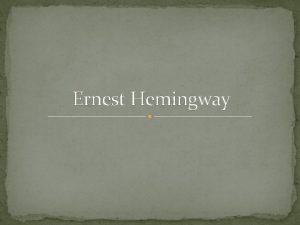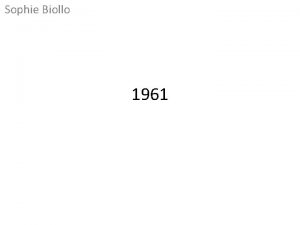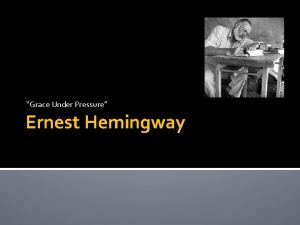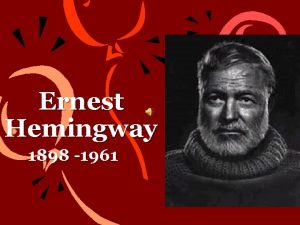Ernest Hemingway Ernest M Hemingway Born July 21

Ernest Hemingway

Ernest M. Hemingway Born July 21, 1899 in Oak Park, IL Attended Oak Park River Forest High School Worked as journalist on school newspaper and after college immediately got job with Kansas City Star Huge influence in his prose style writing “On the Star you were forced to learn to write a simple declarative sentence. This is useful to anyone. Newspaper work will not harm a young writer and could help him if he gets out of it in time. "

Hemingway In 1918, he served as an ambulance driver in the Italian army Met a nurse who served as his inspiration for famous works “A Very Short Story” and A Farewell to Arms because she left him for another man. Continued working for various newspapers after the war and married Hadley Richardson In Paris, became part of what was known as “The Lost Generation. ”

Hemingway Gertrude Stein introduced him to many of the famous authors and artists of his time including: F. Scott Fitzgerald, Ezra Pound, Picasso. After a child and divorce with his first wife, Hemingway quickly remarried and moved back to the United States (Key West). Here he completed his most celebrated work A Farewell To Arms After a few more years, Hemingway would divorce his second wife and quickly marry a third.

Hemingway During WWII, he was on site for many of the war’s key battles including the DDay landing. In 1951, he won the Pulitzer Prize for his novel, The Old Man and the Sea His health began to decline after many trips to Africa where he survived multiple plane crashes In 1954, he was diagnosed with liver disease and high blood pressure; he retired to Idaho, but both his mental and physical health would continue to decline. On July 2, 1961 Hemingway committed suicide at his home.

Personality By all accounts was world traveler, fearless, bold, adventurous, fiercely independent, an alcoholic, and though macho in every stereotypical way, also a deeply sensitive writer who captured the sense of alienation that haunted the Lost Generation


Style Changed writing from the old formal way (Theodore Dreiser) to a new informal style Noun+verb+object=Hemingway Solely responsible for a brand new form of writing Use of deliberate rhythmic sentences Master of dialogue Iceberg Method of writing “If you leave out important things or events that you know about, the story is strengthened. If you leave or skip something because you do not know it, the story will be worthless. ” -Hemingway

Comparing Styles “The, to Carrie, very important theatrical performance was to take place at the Avery on conditions which were to make it more noteworthy than was at first anticipated"; "They had young men of the kind whom she, since her experience with Drouet, felt above, who took them out. “ -Theodore Dreiser Sister Carrie “If personality is an unbroken series of successful gestures, then there was something gorgeous about him, some heightened sensitivity to the promises of life, as if he were related to one of those intricate machines that register earthquakes ten thousand miles away. ” –F. Scott Fitzgerald The Great Gatsby
![A Farewell to Arms Excerpt She won't die [in childbirth]. She's just having a A Farewell to Arms Excerpt She won't die [in childbirth]. She's just having a](http://slidetodoc.com/presentation_image/5978402490b9ae0829100e4f9ec1cdae/image-10.jpg)
A Farewell to Arms Excerpt She won't die [in childbirth]. She's just having a bad time. The initial labor is usually protracted. She's only having a bad time. Afterward we'd say what a bad time and Catherine would say it wasn't really so bad. But what if she should die? She can't die. Yes, but what if she should die? She can't, I tell you. Don't be a fool. It's just a bad time. It's just nature giving her hell. It's only the first labor, which is almost always protracted. Yes, but what if she should die? She can't die. Why would she die? What reason is there for her to die? There's a just a child that has to be born, the by-product of good nights in Milan. It makes trouble and is born and then you look after it and get fond of it maybe. But what if she should die? She won't. She's all right. But what if she should die? Hey, what about that? What if she should die? [. . . ] A doctor came in followed by a nurse. He held something in his two hands that looked like a freshly skinned rabbit and hurried across the corridor with it and in through another door. I went down to the door he had gone into and found them in the room doing things to a new-born child. The doctor held him up for me to see. He held him by the heels and slapped him.

"Is he all right? " "He's magnificent. He'll weigh five kilos. " I had no feeling for him. He did not seem to have anything to do with me. I felt no feeling of fatherhood. "Aren't you proud of your son? " the nurse asked. They were washing him and wrapping him in something. I saw the little dark face and dark hand, but I did not see him move or hear him cry. The doctor was doing something to him again. He looked upset. "No, " I said. "He nearly killed his mother. "

Questions to Consider Describe what each passage is saying. Which one is easiest to understand for what reasons? What specific sections from each make for difficulty understanding? What do you notice about the syntax of each passage? What do you think the benefits and disadvantages from each style are?
- Slides: 12
